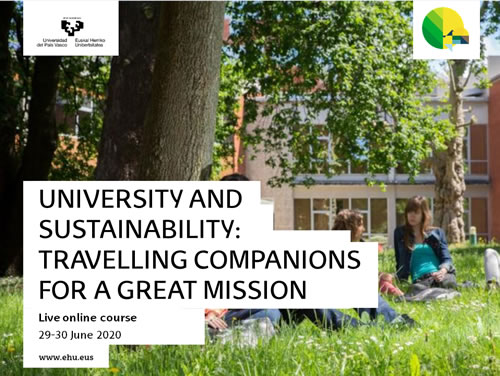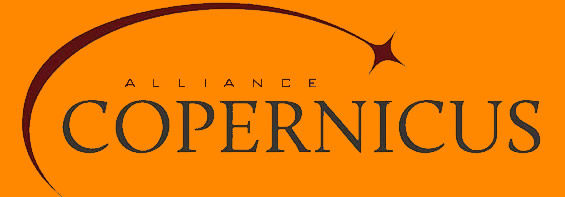 University and sustainability, good practices and alliances for the implementation of the 2030 Agenda were the key themes of the summer course “University and sustainability: travelling companions for a great mission”, organized by the Directorate of Sustainability of the University of the Basque Country (UPV/EHU). The objective of this online course was to showcase the steps that universities are making to address the 2030 Agenda’s mandate. The CA participated at one of the sessions with other higher education networks such as GUNi, REDS (SDNS), and Euskampus, and presented its approach to transformative networking.
University and sustainability, good practices and alliances for the implementation of the 2030 Agenda were the key themes of the summer course “University and sustainability: travelling companions for a great mission”, organized by the Directorate of Sustainability of the University of the Basque Country (UPV/EHU). The objective of this online course was to showcase the steps that universities are making to address the 2030 Agenda’s mandate. The CA participated at one of the sessions with other higher education networks such as GUNi, REDS (SDNS), and Euskampus, and presented its approach to transformative networking.
University and sustainability, good practices, and alliances for the implementation of the 2030 Agenda were the key themes of the summer course organized by the Directorate of Sustainability of the University of the Basque Country (UPV/EHU). The objective of this online course was to showcase the steps that universities are making to address the 2030 Agenda's mandate.
After the presentation of the course by Estibaliz Saez de Camara, the Director of Sustainability, Kate Roll, from the University College London - Institute for Innovation and Public Purpose (IIPP), reflected on six key transformations in higher education to achieve the Sustainable Development Goals. Universities play a fundamental role not only in training the next generation and leading the transition towards sustainable development. There is a need to use a whole-institutional approach involving all the higher education community and to combine top-down visions with bottom-up approaches.
Then, Idoia Fernández (Vice-rector for Innovation, Social Commitment and Cultural Action at the UPV/EHU), Rafael Miñano (lecturer at the Technical University of Madrid) and Pietro Ceciarini (researcher at the University of Bologna) presented their universities’ plans and good practices for the implementation of the 2030 Agenda. This round table was moderated by David Alba (lecturer at the Autonomous University of Madrid, also a COPERNICUS Alliance member).
All participants agreed that culture is one of the biggest challenges that universities need to face. In this sense, Itziar Idiazabal, Coordinator of the UNESCO Chair on World Language Heritage at the UPV/EHU, emphasized the need to include another SDG (17+1) for Linguistic and Cultural Diversity. In addition, she stated the UPV/EHU's contribution with the addition of its own commitment to linguistic and cultural diversity.
Then, Duncan Ross, responsible for the THE Impact Rankings, highlighted that rankings may help us understand how a university is performing in delivering progress around the SDGs. He emphasized that, contrary to the common belief that rankings promote competition, many of the indicators are explicitly about collaboration, as SDG 17, “partnerships for the, goals”, is compulsory to participate in this ranking.
Finally, Ingrid Mulà (COPERNICUS Alliance), Josep Maria Vilalta (Global University Network for Innovation), Igor Campillo (Euskampus), Marta García and Javier Benayas (Sustainable Development Solutions Network-Spain) discussed the role of higher education alliances in the implementation of the Agenda 2030. This round table was facilitated by Miren Onaindia (UNESCO Chair of Sustainable Development and Environmental Education of the UPV/EHU).
